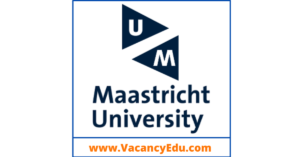Maastricht University, Netherlands invites online Application for number of Fully Funded PhD Degree at various Departments. We are providing a list of Fully Funded PhD Programs available at Maastricht University, Netherlands.
Eligible candidate may Apply as soon as possible.
(01) PhD Degree – Fully Funded
PhD position summary/title: PhD candidate: chemical modification of starch
PhD candidate: chemical modification of starch
- Our goal: We develop biodegradable materials from local, renewable resources to replace fossil-based plastics, advancing climate targets and circular value chains.
- Your colleagues: You’ll join AMIBM, a multidisciplinary team at Brightlands Chemelot Campus, working with academia and industry to turn sustainable materials research into real-world solutions.
This PhD position gives you the opportunity to work at the cutting edge of polymer chemistry, green synthesis, and sustainable materials development. You’ll be part of a growing interdisciplinary research community working across sectors and borders to realise the ambitions of the European Green Deal—starting from something as humble as the waste from potato industry.
Deadline : 5 Jan ’26
(02) PhD Degree – Fully Funded
PhD position summary/title: PhD Candidate Predicting Adherence to Digital Health-Promoting Interventions
We are seeking a PhD candidate on predicting adherence to digital health-promoting interventions with Artificial Intelligence (AI) and machine learning (ML) techniques. You will develop AI-based predictive models to anticipate user engagement, primarily using data collected through unobtrusive measurements (e.g., websites, smartphones, smartwatches). The goal is to construct a AI-driven framework that predicts both intervention use (e.g., content exposure, study protocol completion) and behavior. Better adherence prediction is crucial to support the development, tailoring and delivery of health promoting interventions, and ultimately their effectiveness and success.
Deadline : 21 Oct ’25
View All Fully Funded PhD Positions Click Here
(03) PhD Degree – Fully Funded
PhD position summary/title: PhD-positions in field of Operations Research
We are looking for a PhD-candidate interested in topics that lie on the border of optimization by the use of heuristic algorithms and (Explainable) Artificial Intelligence ((X)AI). Specifically, in this position, the chosen candidate will conduct research on how machine learning techniques or XAI can be leveraged by heuristic algorithms, or conversely, how heuristics can be enhanced by incorporating machine learning techniques. Research proposals on these topics are welcome, but not mandatory. We also encourage candidates with a broader interest in Operations Research and/or Data Science to apply.
Deadline : 10 Mar ’26
(04) PhD Degree – Fully Funded
PhD position summary/title: PhD in Behavioral/Experimental Economics and Economic Theory
The Department of Microeconomics and Public Economics is looking for a PhD candidate in behavioral/experimental economics and economic theory to join the new project “Who bans what? Large-scale evidence for the aversion against market transactions and its implications for policy design” that is funded by an NWO Open Competition M grant.
Many market transactions face substantial opposition or are banned based on feelings of aversion against these transactions. Your research will generate insights into why people reject markets in critical domains like health and the environment, and how better-designed institutions can increase societal acceptance.
As a PhD candidate, you will design and conduct large-scale economic experiments and surveys, analyze rich datasets, and build microeconomic models that explain behavior and predict the impact of different policies to improve the societal acceptance of market mechanisms and market transactions.
Deadline : 13 Oct ’25
(05) PhD Degree – Fully Funded
PhD position summary/title: PhD on Investigating Human Cortical Angioarchitecture with 3D Histology
The mapping of local differences in the brain’s cortical architecture has a long history. The most ubiquitous example of such a cortical map are the brain areas delineated by Korbinian Brodmann, which were based on differences in the arrangement of neuronal cells (cytoarchitecture). Another important area of architectonics that has received less attention is the arrangements of blood vessels across the cortical sheet (angioarchitecture). However, a detailed understanding of human angioarchitecture is of great importance for various reasons: e.g. differences in vascular densities might predispose some brain areas more for vulnerabilities to vascular disease. Mapping the human angioarchitecture could therefore help to elucidate why some brain areas are affected earlier or more by vascular disorders such as vascular dementia. Additionally, cortical vasculature is the underlying signal source for non-invasive brain imaging techniques such as fNIRS or fMRI. With the constantly improving spatial resolution of these methods, a thorough knowledge of potential differences in vascular architecture within and between different cortical layers and brain areas becomes increasingly important.
The aim of this PhD project is therefore to investigate human angioarchitecture of different cortical brain areas (primary sensory, primary motor, association) in large tissue samples and at microscopic resolution with modern 3D histology methods. Specifically, brain samples will be rendered transparent with optical tissue clearing methods and imaged with 3D microscopy techniques, particularly light-sheet microscopy. The vascular network will be differentiated into arterial, veinous, and capillary components to derive quantitative differences of these components across cortical depth as well as between brain areas. Finally, this project aims to compare homologue areas between human and other mammals, to shed light on the human brain’s unique vulnerability to vascular disorders.
Deadline : 1 Nov ’25
Polite Follow-Up Email to Professor : When and How You should Write
Click here to know “How to write a Postdoc Job Application or Email”
(06) PhD Degree – Fully Funded
PhD position summary/title: PhD Candidate in Molecular Imprinting and Device Fabrication
This PhD project aims to develop an electrochemical sensory platform using Molecularly Imprinted Polymers (MIPs) for detecting polyfluoroalkyl substances (PFAS). MIPs, which mimic antibodies through molecule-specific binding sites created during synthesis, have previously been developed by the SE department for various targets, including some PFAS. The selected PhD student will advance this work by creating a new electrochemical MIP-based detection system and its associated hardware.
This project addresses the growing need for efficient PFAS detection, as these persistent “forever chemicals” are linked to various health risks including liver damage, cancer, and fertility issues. With increasing EU regulations and scrutiny in land development, our goal is to develop advanced, reliable MIP-based sensors for rapid PFAS identification in environmental analysis, reducing exposure and aiding site assessments.
Deadline : 20 Oct ’25
(07) PhD Degree – Fully Funded
PhD position summary/title: PhD Candidate for national Study on Bleeding Disorders of Unknown Cause (BDUC-iN)
Are you passionate about haemostasis and advancing the understanding and care for persons with a bleeding disorder of unknown cause with a societal impact? Join our interdisciplinary team as a PhD candidate in the BDUC-iN study!
Are you passionate about haemostasis and committed to advancing the understanding and care of people with bleeding disorders? Join our interdisciplinary team as a PhD candidate in the national BDUC-iN study.
Over half of individuals referred to a haemostasis expert for evaluation of their bleeding symptoms receive a diagnosis of Bleeding Disorder of Unknown Cause (BDUC) when standard tests fail to identify a haemostatic defect. These patients face symptoms and risks similar to those with known coagulation disorders (such as von Willebrand disease), with major impact on their quality of life. The absence of clear guidelines for BDUC creates uncertainties around follow-up, treatment, and family planning.
Deadline :
(08) PhD Degree – Fully Funded
PhD position summary/title: PhD Quality of Circularity: Developing integrated metrics for Circular and Sustainable footwear
Join us in shaping the future of circular footwear design. This PhD is part of the Marie Skłodowska-Curie Doctoral Network SCARPA – Sustainable and Circular Footwear Training Program (it is DC 12), which brings together 15 doctoral candidates across Europe to tackle the challenge of making footwear truly circular. The SCARPA network combines top universities, pioneering SMEs, and major footwear brands such as Nike, Adidas, and Decathlon, offering a unique interdisciplinary training and research environment.
This PhD project will focus on advancing circularity metrics so that they capture not only the quantity of recycling, but also the quality and sustainability of circular strategies. The candidate will develop an integrated framework to assess both circularity and sustainability of products, using footwear as a case study while ensuring broader applicability to other product groups.
Building on earlier work with the RecyQMeter (a tool developed by UM and TNO to forecast the properties of recycled plastics), the project will broaden the concept of Quality of Recycling into a more holistic Quality of Circularity framework. This involves developing improved methods to assess material recycling, while also integrating techniques to evaluate how products can be reused, disassembled, repaired, or upcycled; and ultimately determining when such strategies can be credibly considered more sustainable.
Deadline : 3 Nov ’25
Click here to know “How to Write an Effective Cover Letter”
(09) PhD Degree – Fully Funded
PhD position summary/title: PhD Candidate: Engineering a Next Generation of Miniaturized In Vitro Models
Since Julius Petri introduced the glass dish that now bears his name, and Steven Boyden developed the Boyden chamber – the forerunner of modern culture inserts – our understanding of engineered cellular microenvironments has advanced tremendously. State-of-the-art approaches now include microwell arrays for 3D cell culture, as well as microfluidic organs-on-chips (OoCs) and microphysiological systems (MPSs) in various forms. The demands on these culture platforms continue to grow – for example, in the field of cystic epithelial organoids, where further development of these in vitro models is needed for applications in pharmacological research and regenerative therapies. Examples of the latest platform developments include freely suspended, thin collagen membranes that serve as biomimetic substrates in compartmentalized culture systems, for instance, to establish epithelial cell barriers.
Within the above context, the MERLN Institute for Technology-Inspired Regenerative Medicine, part of the Faculty of Health, Medicine and Life Sciences at Maastricht University, is recruiting a PhD candidate. The position is embedded in the Materials-Driven Regeneration (MDR) program and focuses on microengineering the next generation of cell culture platforms. The goal is to develop miniaturized in vitro models that enable more realistic, spatiotemporal cell–cell and cell–matrix interactions as well as distribution of soluble factors.
Deadline : 3 Nov ’25
(10) PhD Degree – Fully Funded
PhD position summary/title: PhD in Cardiovascular Data Science & Hemodynamic Monitoring in the ICU
In this PhD project, you will:
- investigate cardiovascular function and risk factors in critically ill patients using electrocardiograms (ECGs) and computed tomography (CT) data from a very large (> 20,000 ICU admissions) high-quality ICU data set.
- work with a large cardiovascular ICU database, containing over 20,000 ECGs and CT scans and use advanced data-driven methods, including artificial intelligence (AI) and machine learning to improve outcome prediction and patient stratification.
- deepen our understanding of the etiology, clustering, and diagnostics of cardiovascular diseases in critically ill patients.
Deadline : 27 Oct ’25
Connect with Us for Latest Job updates
About Maastricht University, Netherlands –Official Website
Maastricht University is a public university in Maastricht, Netherlands. Founded in 1976, it is the second youngest of the thirteen Dutch universities.
In 2019, 19,000 students studied at Maastricht University, 54% of whom were foreign students, with over 4,000 employees. About half of the bachelor’s programmes are fully offered in English, while the other half is taught wholly or partly in Dutch. Most of the master’s and doctoral programmes are in English. Besides traditional programmes, Maastricht University also has an honours liberal arts college: University College Maastricht and a Maastricht Science Programme in the same liberal arts tradition. The satellite University College Venlo opened in 2015.
Disclaimer: We try to ensure that the information we post on VacancyEdu.com is accurate. However, despite our best efforts, some of the content may contain errors. You can trust us, but please conduct your own checks too.
Related Posts




